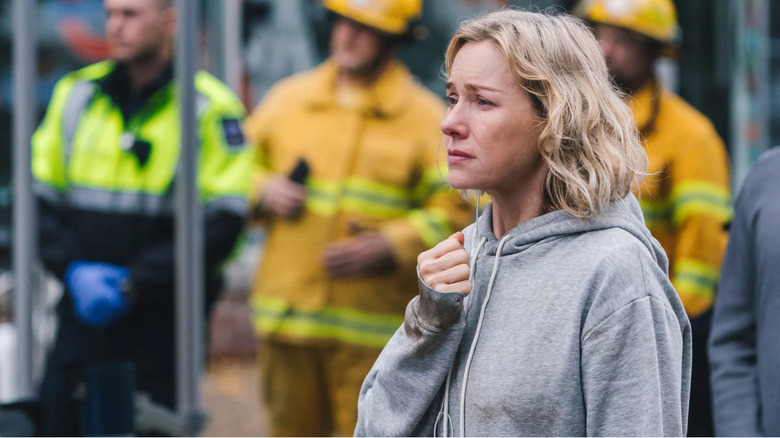Lakewood Review: Naomi Watts Races Against The Clock In This Overblown School Shooting Drama [TIFF 2021]
That most horrible — and American — of institutions, the school shooting, is the impetus behind "Lakewood," Phillip Noyce's frantic, overblown blend of drama and thriller. The basic concept behind the film — a mother racing against the clock to get to her child during a shooting — could yield something potentially great, devastating, and timely in the right hands. But Noyce and screenwriter Chris Sparling are uninterested in that. They merely want to use the shooting as a device and an excuse to have Naomi Watts run around out of breath for an hour and a half. Watts, for her part, does the best she can, throwing herself into the role to deliver a panicked, stressful performance, but she's done no favors by the overbearing style of the film.
Starting with idyllic overhead shots of sprawling woods, winding rivers, and beautiful landscapes, "Lakewood" gets things started with grief. Amy Carr (Watts) wakes one morning listening to a self-help audiobook on dealing with grief, and with good reason: the one-year anniversary of her husband's death is only a few days away. It's clear that it's been a hard year for Amy, and the wounds are still fresh. She struggles to get out of bed and then immediately texts her office to announce she's taking a personal day. Amy's young daughter (who, in one of the film's more interesting choices, is shot in an obscured way so we never really see her face) appears to be coping with things a lot better and happily bounds off to catch the school bus. But Amy's teenage son Noah (Colton Gobbo) is the complete opposite. He hasn't even gotten out of bed yet, and when Amy tries to get him up to go to school, he refuses.
These early moments, while melodramatic with plenty of weepy music, are solid enough, and things continue down that solid path as Amy puts on her earbuds and heads out on a run. Amy has one of those movie phones — the type that can do seemingly anything, even have a digital voice that announces who is calling so we, the audience, can stay informed and so Noyce doesn't have to continually cut away to the screen. On her run, Amy fields what seems like ten million calls, and it's here where the cracks begin to form in "Lakewood." Amy takes one phone call after another after another, a decision that quickly saps the movie of any momentum it might have had.
Amy's run takes her down a road flanked by trees, and it looks like she's in the middle of nowhere. Here, Noyce stages an effective sequence: Amy sees a cop car go zooming by at breakneck speed. Not long after, even more cop cars follow in the same direction, sirens screaming. The implication is clear: something has gone very wrong somewhere. Unassuming, Amy doesn't really give this much thought. That changes in a heartbeat, though, when she gets an alert on her magic movie exposition phone informing her that all the schools in the area are on lockdown due to a shooting. Panicked, Amy's first thought is of her daughter's school, but she quickly learns the shooting isn't there — it's at the high school. There's a slight tinge of relief here, as Amy thinks Noah is still in bed. But even more terror sets in when Amy finds out that Noah went to school after all.
All of this stuff is understandably distressing, which means it requires Watts to remain in a state of sheer terror for an extended length of time. And while Watts' acting talents are not in question — she's great! — listening to her frantically pant out her lines out of breath starts to get tiresome. She keeps talking as she runs, which means her words come in strange, arrhythmic clips. "Lakewood" turns into a one-woman show here, with Amy frantically trying to find her way to the school. She trips and hurts her ankle, meaning she has to hobble.
None of us can know how we'd behave in such a crisis until it actually happens to us, so to criticize Amy's decisions is probably a fool's errand. She's obviously not thinking rationally, so her poor choices might be understandable. Still, what follows begins to strain logic. Instead of running back home to get her car, which seems like the quickest and most sensible option, Amy decides to run to the school even though her phone tells her it's about an hour's walking/running distance away. Amy also calls for a Lyft, but instead of staying in one place to wait for the driver, she keeps on moving, thus ensuring that the car can't find her. Along the way, she keeps fielding phone calls to a series of characters she drafts into helping her, including an extremely helpful 9-1-1 operator who apparently has nothing else to do, and an auto mechanic working right by the school who puts his own life in potential danger in order to fill Amy in on the details. And then a bomb drops: a detective gives Amy a call and asks if she has any guns in her house.
Amy Runs, and Runs, and Runs
The implication is clear: Noah is a suspect in the shooting. Amy, however, can't — or won't — grasp this, and she keeps yelling, "Why are you asking me that?!" into the phone over and over again. Again: unless something like this happens to us, how are we to know how we'd behave? But it starts to feel like Amy's constant questions aren't really to serve her character, they're there to provide the audience with hand-holding exposition, just in case someone isn't following along.
And through it all, Amy keeps running. And running. And running. There's even a part where she runs through a shallow river. The point is clear: mothers are all-powerful and will do anything it takes when one of their children is in danger! She's a mama bear and she's angry! And so on. But the over-the-top tone of everything going on here, from the constant music that is in place to tell us exactly how to feel and when to feel it, to the questionable shot choices — there are multiple dutch angles and slow-motion moments — starts to make the entire thing rather comical.
The idea that Amy's son could be the shooter should lend some weight to this whole thing, but the movie blows past it and quickly tells us that, never mind, it's not Noah after all. And then things only get sillier. At one point, Amy uses her very special set of skills, as if she were Liam Neeson in "Taken," to track down the shooter's phone number and call him on phone. Such an action requires some suspension of disbelief, but not as much as what comes next: the cops call Amy and ask her to call the shooter again and act as a kind of negotiator, even though she has absolutely zero training for such an act, and therefore could be making things worse and putting students, including her son, in even more danger.
All of this might be acceptable, maybe, if "Lakewood" had anything to say about school shootings. But it doesn't. It simply uses the school shooting the way "Die Hard" uses terrorism. It's not interested in dissecting the problem, or saying anything other than "School shootings are bad." Yes, we know. Then again, maybe we don't know, since they seem to keep on happening in this country and no one will do a damn thing about them.
I'm sure "Lakewood" had its heart in the right place, and Watts, gosh love her, is really trying, since she's pretty much the only person on screen for most of the movie. But every step Amy takes towards the school is another misstep the movie makes, and by the time she gets to her destination, we've already mentally checked out.
/Film Rating: 4 out of 10

